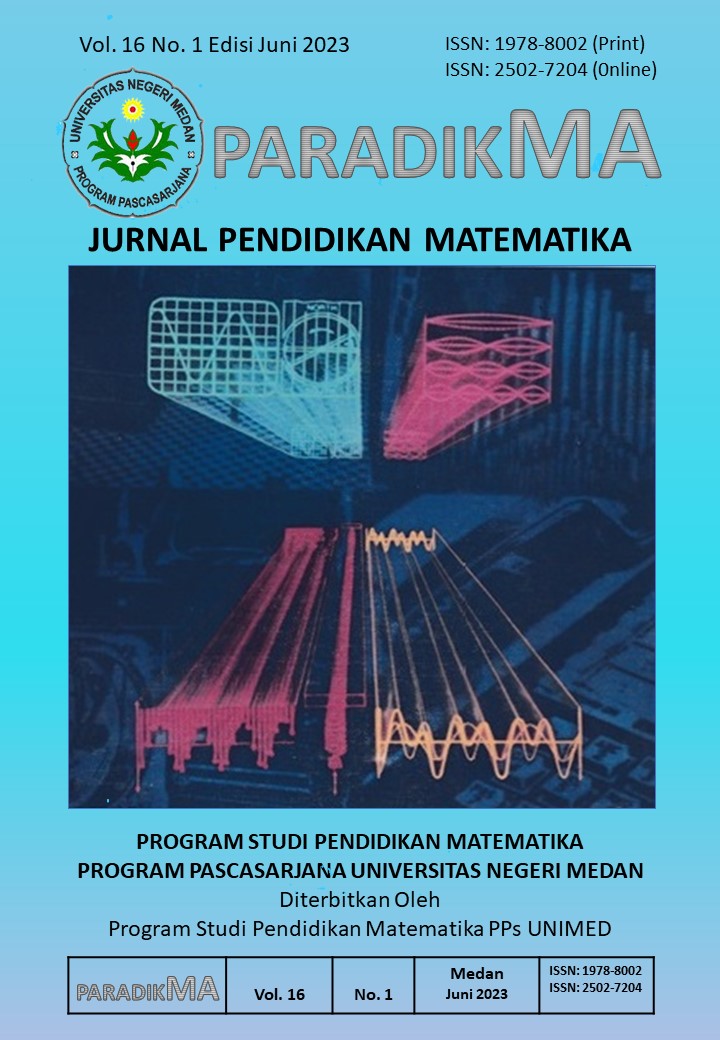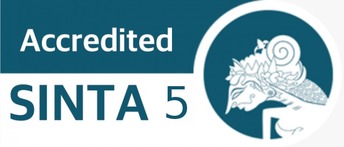Development of Problem-Based Number Theory Learning Tools
DOI:
https://doi.org/10.24114/paradikma.v16i1.42074Abstract
Development of Problem-Based Number Theory Learning Tools" in the 2022 FMIPA Unimed Mathematics Education Lecture. This research is the development of learning tools that aim to describe the development process that produces valid, practical, and effective number theory learning tools. Problem-Based Number Theory Learning developed by following the Four D's: Define, Design, Develop, and Disseminate. The trial of device development was carried out in the S1 Mathematics Education Study program in the Number Theory lecture. In the development of number theory lecture tools produce: Textbooks, and 14 Lesson Plans (LP) that are valid, practical and effective. The implementation process is carried out by preparing components of teaching materials for the Number Theory course in the form of: textbooks, LP which are carried out in the Number Theory course in 2022. In the implementation of disseminate applying limited Number Theory teaching materials produced: LP as many as 14 valid, practical and effective meetings to the Lecturer Team in the Department of Mathematics FMIPA Unimed.Keywords: Development Research, Problem Based Learning, Problem Solving, Learning Tools, Number Theory.References
Amir, M.T. (2009). Inovasi Pembelajaran Pendidikan Melalui Problem Based Learning: Bagaimana Pendidik Memberdayakan Pemelajar di Era Pengetahuan. Jakarta.
Arends, R. I. (2008). Learning To Teach. Yogjakarta: Pustaka Belajar.
Clark, W. E. (2003). Elemntary Number Theory. Diakses dari: http://shell.cas.usf.edu/~wclark/elem_num_th_book.pdf.
Dahar, R. W. (1989). Teori Belajar. Jakarta: Erlangga Press
Gagne, R. M. (1970). The Conditions of Learning. New York: Holt Rinehart and Winstone
Guru Pembelajar & Tenaga Kependidikan. (2016). Teori belajar, himpunan, dan logika matematika modul matematika. Jakarta: Direktorat Jenderal Guru & Tenaga Kependidikan Kementerian Pendidikan Kebudayaan.
Ibrahim, M. dan Nur, M. (2000). Pembelajaran Berdasarkan Masalah, UNESA
Ismail. (2002). Pembelajaran Berdasarkan Masalah (Problem-Based Instrution). Makalah disajikan pada pelatihan TOT Pembelajaran kontekstual. Surabaya.
Nieveen, N. (2007). An Introduction to Education Design Research. China: The east China Normal University.
Nugroho, D. B. (2009). Teori Bilangan. Salatiga: Universitas Satya Wacana.
Padmavathy & Mareesh. (2013). Effectiveness of Problem Based Learning in Mathematics. International Multidisciplinary e-Journal, 2 (1): 45 “ 51.
Siagian, P. (2017). Prototype Teaching Mathematics in Improving Critical Thinking Ability of Senior High School Students. International Journal of Innovation in Science and Mathematics, 2 (2): 57-61.
Sierprinski, W. (2015). 250 Problems in Elementary Number Theory. Modern Analytic and Competational Methods in Science and Mathematics.
Sinaga, B. (2007). Pengembangan Model Pembelajaran Matematika Berdasarkan Masalah Berbasis Budaya Batak (PBMB3). Disertasi tidak diterbitkan. Surabaya, PPs. UNESIA.
Srein, W. (2017). Elementary Number Theory: Prmes. Congruens, and Secrets. Diakses dari: https://wstein.org/ent/ent.pdf.
Sugiono. (2010). Metode Penelitian Kuantitaif Kualitatif dan R & D. Bandung: Alfabeta
Suherman, E., dkk. (2001). Strategi Pembelajaran Matematika Kontemporer. Bandung: JICA Universitas Pendidikan Indonesia (UPI).
Sukirman. (2016). Pengantar Teori Bilangan. Jakarta: Karunika Universitas Terbuka.
Thiagarajan, S., dkk. (1974). Instructional Development for Training Teachers of Exceptional Children. Washinton DC: National Center for Improvement Educational System.
Trianto. (2011). Mendesain Model Pembelajaran Inovatif-Progresif. Surabaya: Kencana Prenada Media Group.







